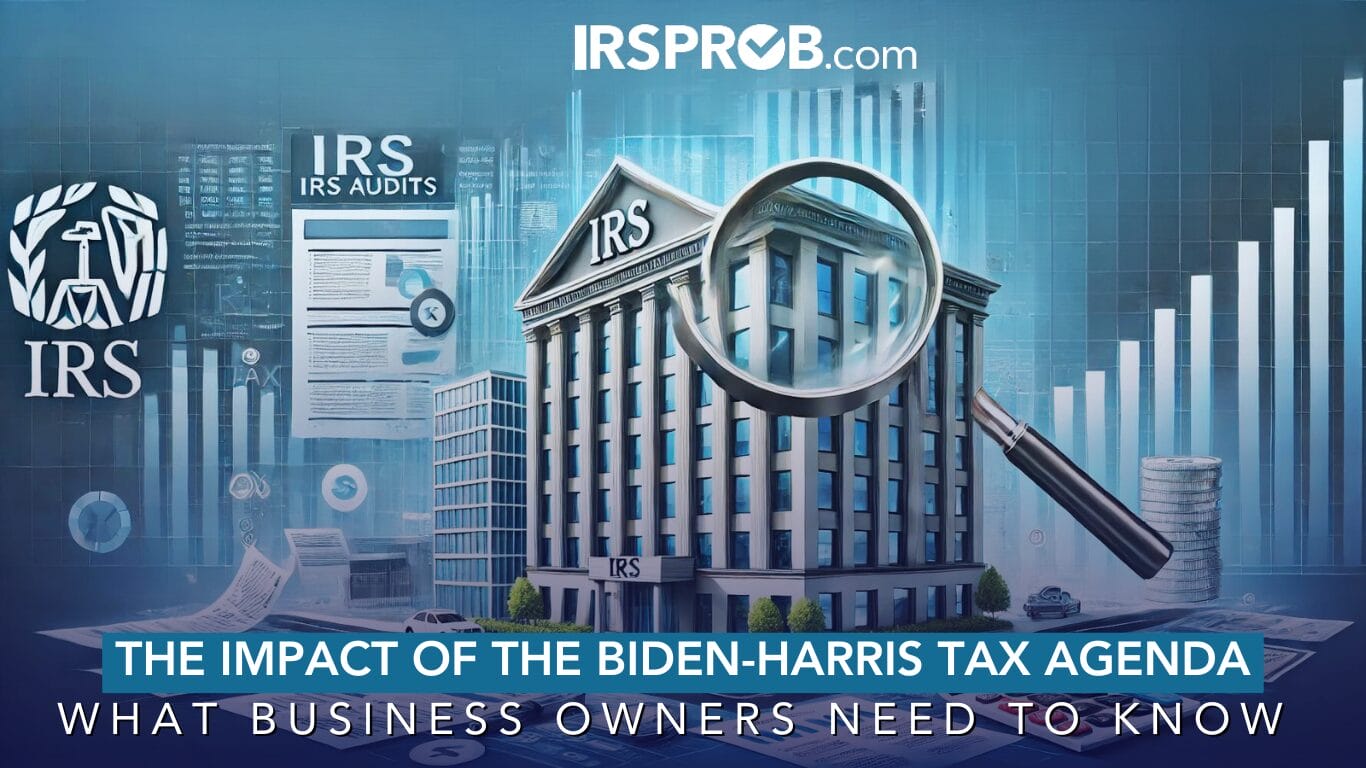
The recent endorsement of an IRS-affiliated union by Vice President Kamala Harris has caused quite a stir, with critics expressing concerns about potential tax increases on both individuals and businesses. This event is part of a larger narrative surrounding the Biden-Harris administration’s tax policies, which aim to increase federal revenue through heightened enforcement and revisions to the tax code. But what does this mean for business owners, and how can you prepare for the potential impact?
The IRS Is Getting More Aggressive
The administration has emphasized its commitment to increasing tax enforcement, particularly among high-income earners and corporations. As part of the Inflation Reduction Act, the IRS received an $80 billion funding boost, with a significant portion earmarked for hiring additional agents and modernizing technology to enhance tax audits and collections. This means that small business owners should prepare for an increased likelihood of audits, especially if you report high income or have complex financial arrangements.
What You Should Do:
- Stay Organized: Ensure all your financial records are accurate, up-to-date, and well-documented. This includes maintaining receipts, invoices, bank statements, and payroll records.
- Hire a Tax Professional: A qualified tax advisor can help identify potential red flags in your tax filings and ensure that your business remains in compliance with IRS regulations.
Potential Tax Increases on the Horizon
The administration has proposed several changes to the tax code that could have significant implications for small business owners. These include:
- Corporate Tax Rate Increase: There are plans to raise the corporate tax rate from 21% to 28%. If this change occurs, C corporations will face higher tax liabilities, reducing after-tax profits.
- Increased Individual Tax Rates: For high-income earners, the administration proposes increasing the top individual tax rate from 37% to 39.6%. This could affect business owners who pass income through their personal tax returns, such as those operating S corporations or partnerships.
- Capital Gains Tax Changes: Proposed changes include taxing capital gains as ordinary income for taxpayers earning over $1 million. This would significantly impact business owners looking to sell their businesses or other investments.
Strategies to Consider:
- Review Your Business Structure: Evaluate whether your current business structure is still the most tax-efficient under these proposed changes. For instance, switching from a C corporation to an S corporation or vice versa might be worth considering, depending on your business’s profitability and future growth plans.
- Plan for Capital Gains: If you’re considering selling your business or other assets, it might be prudent to accelerate these transactions before any potential tax law changes take effect.
Increased Reporting Requirements
As part of the administration’s plan to close the tax gap, there is a push for increased reporting requirements on businesses. One significant proposal is requiring financial institutions to report more detailed information on business transactions to the IRS. This aims to reduce underreporting of income but could lead to more scrutiny of your business’s financial activities.
How to Stay Ahead:
- Ensure Accurate Record-Keeping: With the IRS focusing on tracking business transactions, having precise and detailed financial records is more important than ever.
- Use Technology: Consider investing in accounting software that can automate record-keeping and generate reports that align with IRS requirements, reducing the chance of errors.
The Importance of Tax Planning
Given the likelihood of increased audits, stricter enforcement, and potential tax rate hikes, now is the time for business owners to be proactive about tax planning. Effective tax planning can help minimize your tax liability, optimize deductions, and ensure you stay compliant with evolving tax laws.
Key Areas to Focus On:
- Maximize Deductions: Ensure you take full advantage of available deductions, such as those for business expenses, home office deductions (if applicable), and retirement plan contributions.
- Consider Retirement Planning: Contributions to retirement plans, such as a SEP IRA or 401(k), not only help secure your financial future but can also reduce your taxable income.
- Monitor Changes in Tax Legislation: Stay informed about proposed and enacted changes in tax laws to adjust your tax strategy accordingly.
Increased IRS Scrutiny of Employee vs. Independent Contractor Status
The IRS is also paying close attention to how businesses classify workers. Misclassifying employees as independent contractors can result in significant tax penalties, as well as back wages and benefits.
Steps to Protect Your Business:
- Review Worker Classifications: Regularly review how you classify workers and ensure they meet the criteria set forth by the IRS. Misclassifying workers can lead to costly penalties and legal challenges.
- Maintain Proper Documentation: Keep records of all agreements, invoices, and communications with independent contractors to demonstrate that they meet the IRS criteria for independent contractor status.
Preparing for a Potential Estate Tax Increase
There’s also talk of reducing the estate and gift tax exemption, which could impact business owners planning to transfer wealth or business interests to the next generation. Currently, the estate tax exemption is $12.92 million for individuals and $25.84 million for married couples (as of 2024). However, this exemption could be reduced, resulting in a greater portion of your estate being subject to taxation.
What Business Owners Should Do:
- Consider Gifting Now: If you plan to transfer wealth or business interests, doing so now might help you take advantage of the higher exemption before it potentially decreases.
- Review Estate Plans: Work with a tax advisor to ensure your estate plan is structured to minimize tax liabilities and protect your legacy.
Conclusion
The Biden-Harris administration’s tax policies are likely to have a significant impact on business owners in the coming years. By taking proactive steps—such as ensuring compliance, exploring tax-efficient strategies, and staying informed about legislative changes—you can protect your business and stay ahead of potential tax challenges.
Now is the time to engage with a knowledgeable tax professional who can help you navigate these changes and position your business for success in an evolving tax landscape. For more information on how you can prepare your business, be sure to consult the relevant sections of the tax code or reach out to IRSProb.com for guidance tailored to your unique situation.









